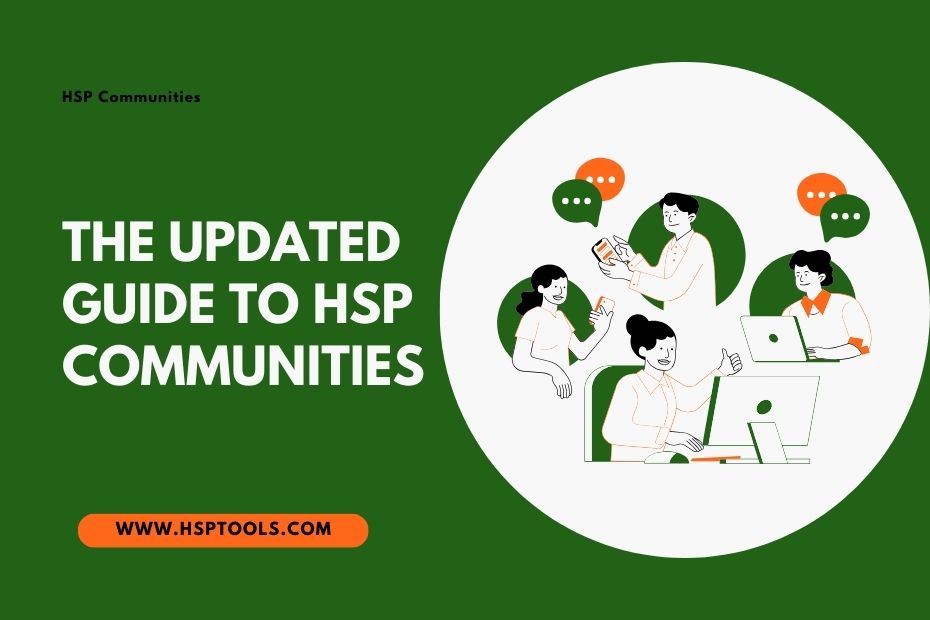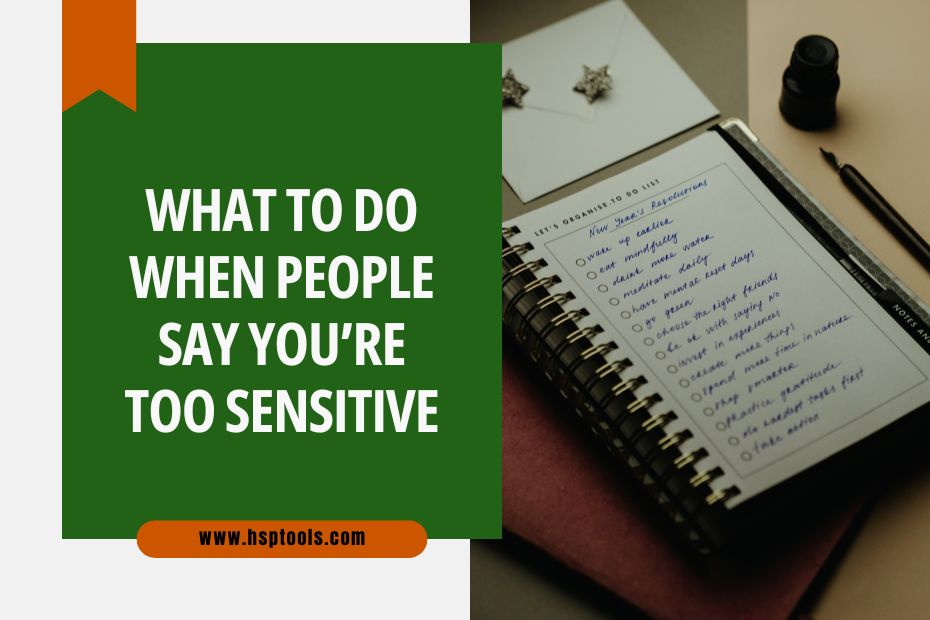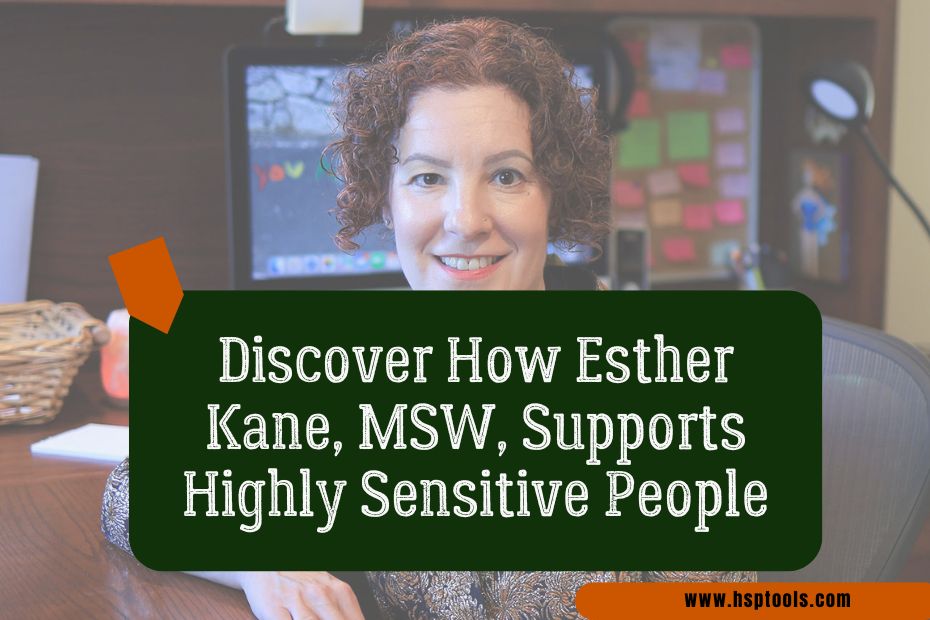How to Prevent HSP Burnout: 10 Practical Tips to Get You Started
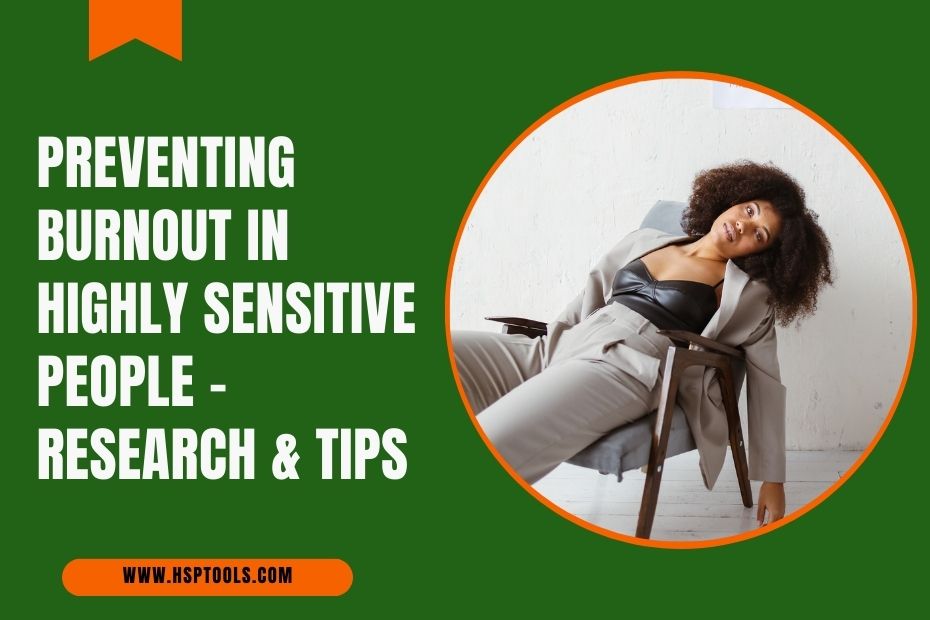
Burnout has become an increasingly common problem in our fast-paced, high-demand world. And if you’re a Highly Sensitive Person (HSP), the likelihood of experiencing burnout may be even higher.
The unique traits of being highly sensitive—such as deep emotional processing, acute awareness of stimuli, and empathy—can make you more prone to feeling overwhelmed and drained.
But being sensitive doesn’t mean you’re powerless against HSP burnout.
By understanding how your sensitivity works and implementing specific strategies, you can protect yourself from its negative effects.
This article explores what makes HSPs more susceptible to burnout, examines the primary causes of this issue, and offers concrete steps to help you prevent burnout.
It also draws on the latest research to support these strategies, ensuring you have both practical and scientifically backed tools to manage your sensitivity.

Understanding Burnout in Highly Sensitive People (HSPs)
Burnout is defined as a state of emotional, physical, and mental exhaustion caused by prolonged stress. It’s more than just feeling tired and can lead to a sense of detachment, a lack of motivation, and even physical illness.
While anyone can experience burnout, Highly Sensitive People (HSPs) are especially vulnerable due to their heightened sensitivity to their surroundings and emotions.
Elaine Aron, the psychologist who coined the term “Highly Sensitive Person,” estimates that around 20-30% of the population has this trait.
As an HSP, your nervous system is more finely tuned to external stimuli, and you process information more deeply than others. This can be a strength, giving you greater insight and empathy, but it can also mean you are more easily overwhelmed by stressors that others may brush off.
The Overstimulation Trap
One of the main reasons HSPs are more susceptible to burnout is overstimulation. You’re likely more aware of environmental factors—loud noises, bright lights, chaotic settings, or intense social situations.
While these stimuli may not bother others, they can leave you feeling mentally exhausted after a short period and if not checked, can lead to chronic stress.
Emotional Exhaustion
Another key factor in HSP burnout is emotional exhaustion. HSPs are known for their strong emotional reactions to bad and good situations.
Whether it’s absorbing the emotions of others or feeling deeply about personal challenges, the intensity of these experiences can be draining.
For instance, you might find yourself empathizing deeply with a friend’s problems, or feeling the weight of social injustice, to the point where it leaves you mentally and emotionally depleted.
When emotional exhaustion sets in, it can lead to a sense of detachment from your usual joy and passions, which ultimately contributes to HSP burnout. (source)
Perfectionism and People-Pleasing
Highly Sensitive People are often empathetic and conscientious, which can translate into perfectionism or people-pleasing tendencies.
This means you may feel constant pressure to meet high standards, perform well, or take care of others’ needs before yours.
Over time, this can contribute to feelings of inadequacy, stress, and eventually burnout, as the emotional energy spent on pleasing others drains your ability to care for yourself.
Lack of Boundaries
HSPs often have a hard time setting boundaries. As one, you may fear disappointing others, take on too many responsibilities, and feel guilty when you say “no.”
Without firm boundaries, your emotional and mental energy can be depleted rapidly, contributing to chronic stress and, ultimately, burnout.
The Latest Research on Burnout and Prevention
Recent research on burnout highlights the growing understanding of the syndrome, emphasizing how emotional regulation and environmental factors contribute to burnout risk.
A study published in the Journal of Applied Psychology found that emotion regulation—or the ability to manage your emotional responses—plays a significant role in whether someone experiences burnout.
For HSPs, this is especially relevant because your deep emotional processing may make it harder to regulate emotions, particularly in stressful or chaotic environments. But by learning emotion regulation strategies, such as mindfulness and cognitive reframing, you can significantly lower your risk of burnout.
Another study in Frontiers in Psychology emphasizes the importance of environmental control. It explored how individuals with more control over their environment, work schedule, and sensory input were less likely to experience burnout.
So, as an HSP, managing overstimulation by controlling your environment can be a key factor in preventing burnout.
Now that we have a clearer picture of what contributes to burnout in HSPs, let’s explore how to avoid it.
10 Ways to Prevent Burnout in Highly Sensitive People
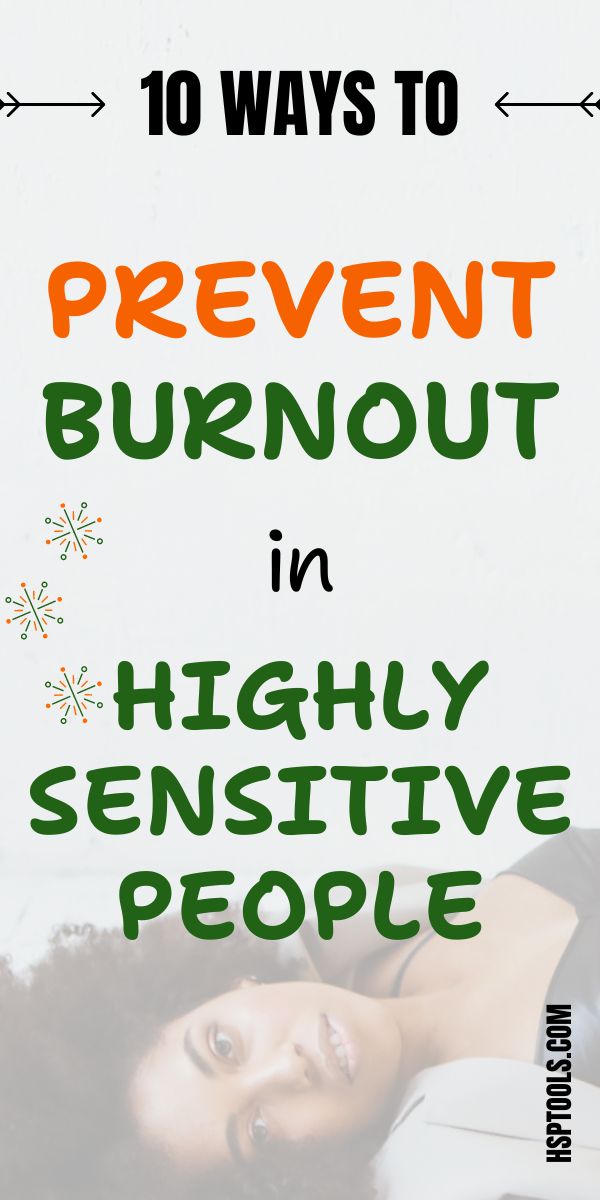
1. Recognize Your Sensitivity as a Strength
Society often praises resilience, toughness, and a go-go-go attitude, but these qualities don’t necessarily equate to long-term well-being.
So, one of the most important steps in preventing burnout is acknowledging that your sensitivity is a strength. It allows you to experience life more deeply, connect with others profoundly, and notice details that others might miss.
By accepting your sensitivity, you can stop fighting against your nature and start working with it. This mindset shift will enable you to create a lifestyle that nurtures your sensitivity rather than depletes it.
2. Set Clear Boundaries
Setting boundaries is crucial to protecting yourself from HSP burnout.
Because, as an HSP, you may be more empathetic and attuned to others’ needs, it can be difficult to say “no” when someone asks for your help. But overcommitting leads to emotional exhaustion.
Start by evaluating your limits. What activities leave you feeling drained? Which situations make you feel overstimulated? Once you identify these triggers, you can begin setting boundaries around them.
Here are 3 tips to get you started:
Learn to say no: Practice saying no in a way that feels comfortable. You can decline invitations without giving a detailed explanation. Simply saying, “I can’t commit to that right now” is enough.
Set limits on social interactions: Limit the number of social events or obligations you take on, especially if they involve intense environments.
Communicate clearly: Be upfront with friends, family, or colleagues about needing downtime. Notify them when you need to recharge and refrain from feeling guilty.
3. Manage Overstimulation with a Sensory-Friendly Environment
As an HSP, your nervous system is more easily overwhelmed by sensory input.
Taking steps to manage overstimulation can significantly reduce the risk of burnout, especially in environments you can’t fully control, like work.
Here are a few tips to consider:
Create a calming space: Whether it’s your home, workspace, or even a small corner where you can retreat, create an environment that minimizes sensory overload. Use soft lighting, soothing colours, and noise-cancelling headphones.
Take sensory breaks: Throughout the day, take short breaks to step away from noise, movement, or chaos. Even a five-minute break to sit in silence can reset your nervous system.
Limit screen time: Digital devices contribute to sensory overload, especially when they involve constant notifications, bright screens, and multitasking. Set boundaries around your use of technology and take frequent breaks from your devices.
4. Practice Emotional Regulation
Since HSPs feel emotions intensely, emotional regulation is an essential skill to prevent burnout. It involves managing how you react to emotional experiences without being overwhelmed by them.
Here are a few strategies to master emotional regulation and prevent HSP burnout:
Mindfulness practices: By practising mindfulness meditation, body scans, or mindful breathing, you can develop the ability to observe your feelings without letting them take over.
Journaling: Writing down your thoughts and feelings helps process emotions and identify patterns that lead to burnout. Journaling can also act as an emotional release, helping you overcome pent-up frustrations.
Cognitive reframing: Cognitive reframing involves changing how you interpret a situation to reduce its emotional impact. For example, if you’re feeling stressed about a work deadline, try reframing it as an opportunity to demonstrate your skills, rather than a threat to your well-being.
5. Prioritize Self-Care
Self-care isn’t just a buzzword—it’s a necessity, especially if you want to avert HSP burnout. Prioritizing self-care means creating routines that allow you to recharge and maintain your emotional, physical, and mental health.
Here are a few self-care ideas to get you started:
Sleep hygiene: Prioritize getting enough rest. A well-rested body and mind are more resilient to stress. Create a calming bedtime routine, avoid screens before bed, and ensure your sleep environment is quiet and comfortable.
Exercise: Gentle forms of exercise, such as yoga, walking, or swimming, are particularly beneficial for HSPs. They not only improve physical health but also reduce stress and improve mood.
Nourishing hobbies: Engage in hobbies that bring you joy and relaxation, whether that’s reading, crafting, gardening, or cooking. These activities help you reconnect with yourself and unwind.
Social self-care: While too much socializing can be overwhelming, maintaining close, supportive relationships can help prevent burnout. Focus on nurturing relationships with people who respect your sensitivity and support your need for downtime.
6. Find Work-Life Balance
Many HSPs struggle to balance the demands of work with their personal life.
Workplace environments can be particularly stressful due to overstimulation, social pressures, and the need for constant multitasking.
To prevent HSP burnout, create a work-life balance that respects your needs and considers the following:
Set boundaries at work: Communicate your needs with your employer or team. This could include asking for a quieter workspace, limiting unnecessary meetings, or advocating for flexible work hours.
Take regular breaks: Don’t push through the workday without taking short, intentional breaks to recharge. Step outside for a quick walk, or spend a few minutes practising deep breathing.
Unplug after work: Avoid checking work emails or messages after work hours. Let your evenings be a time for unwinding and recharging.
Consider remote work: If possible, explore remote or hybrid work options. Working from home can allow you to control your environment better and reduce sensory overload.
7. Seek Professional Support
Sometimes, the best way to prevent burnout is by seeking outside help. A therapist, coach, healer, or another practitioner who understands the unique challenges of HSPs can provide valuable tools and support.
Consider the following:
Therapy: Cognitive-behavioral therapy (CBT) or mindfulness-based therapy can help you develop emotional regulation strategies and improve your ability to cope with stress.
Coaching: Working with a coach who helps HSPs manage stress can provide tailored strategies to prevent HSP burnout.
8. Embrace Rest and Downtime Without Guilt
HSPs often feel pressure to be productive and might view downtime as “wasted time”.
However, rest is essential for recharging, especially for Highly Sensitive individuals and taking breaks is not a luxury but a necessity for mental and emotional health.
Schedule regular breaks: Plan time throughout the day to disconnect and recharge. Whether it’s a quick walk, quiet time with a book, or even a short nap, intentional rest helps prevent overstimulation.
Prioritize quality sleep: Good sleep hygiene is crucial for HSPs. Create a bedtime routine incorporating relaxing activities like reading, journaling, or listening to calming music. Aim for 7-9 hours of quality sleep per night to support your nervous system.
9. Learn to Delegate and Ask for Help
Many Highly Sensitive People feel a strong sense of responsibility and may struggle with delegating tasks or asking for help. This tendency can lead to HSP burnout, especially when juggling too many responsibilities.
So…
Delegate when possible: If at work, identify tasks that can be shared with colleagues or outsourced. If at home, ask family members or housemates to help with chores or responsibilities.
Accept help without guilt: Asking for help isn’t a sign of weakness—it’s a way to protect your energy. Practice accepting assistance from others with gratitude, knowing that it allows you to show up better in other areas of your life.
10. Engage in Nature Therapy
Spending time in nature has been shown to have restorative effects on the nervous system, which is especially beneficial for HSPs.
Nature offers a break from the constant stimuli of modern life and provides a calming environment to recharge.
Take regular nature walks: Whether it’s a walk in a park, a hike in the woods, or even sitting by the ocean, being in nature can help soothe overstimulation and reduce stress.
Practice grounding: Engage in grounding activities like walking barefoot on grass or sand, which can help you reconnect with the earth and calm your nervous system.
Final Word on Preventing HSP Burnout
As a Highly Sensitive Person, you have an extraordinary ability to perceive and process the world differently. But this gift comes with its own set of challenges, particularly when it comes to managing stress and preventing burnout.
By recognizing the factors that lead to HSP burnout—overstimulation, emotional exhaustion, perfectionism, and lack of boundaries—you can take proactive steps to protect your well-being.
Preventing burnout isn’t about changing who you are. It’s about embracing your sensitivity, setting boundaries that protect your energy, managing your emotions, and creating an environment that nurtures rather than depletes you.
So, prioritize self-care, learn to set boundaries, embrace your sensitivity, and seek professional support to enjoy the many benefits of being Highly Sensitive without falling into the HSP burnout trap.



